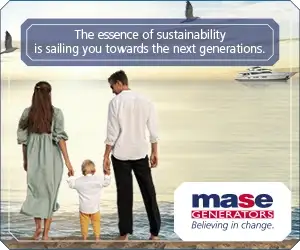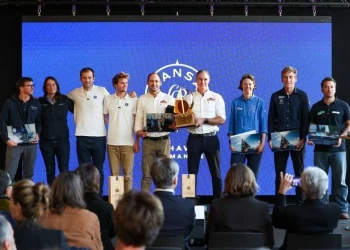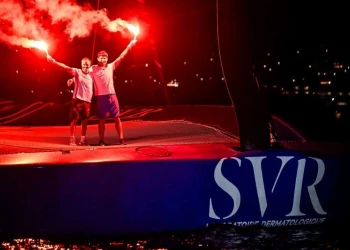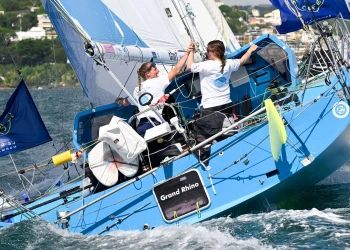
© Jean-Marie Liot / Alea
Charles Caudrelier and Erwan Israël take third in ULTIMs
Minutes after taking a frustrating third place on the Transat Jacques Vabre Normandie Le Havre ULTIM class race, when co-skippers Charles Caudrelier and Erwan Israël brought the giant blue and white Maxi Edmond de Rothschild to rest at Fort de France's ponton d'honneur during a spectacular Martinique dusk, they both wore smiles of relief and no doubt a sense of deliverance after a painful few final days at seas.
Caudrelier's winning record with the giant trimaran has come to an end. For the moment it has been scuppered in part by technical problems which started – according to the French ace 'one minute and 58 seconds' into the 7500 miles race. Though they fought valiantly after Madeira their technical issues meant they no longer were able to match the pace of SVR Lazartigue and Maxi Banque Populaire XI and finishing third became their objective.
"In the end third is better than fourth." Caudrelier, who is more used to winning, asserted, "And we fought hard to make sure we weren't fourth."
After leaving Le Havre on Sunday 29th October they crossed the line at 17:10:43hrs local time (21:10:43hrs TU) this evening to finish 1 day and 22 hours behind race winners Armel Le Cléac'h and Sébastien Josse (Maxi Banque Populaire XI) which finished some five hours ahead of second placed François Gabart and Tom Laperche.
Maxi Edmond de Rothschild's elapsed time for the course is 16 days 9 hours 5 minutes and 43 seconds.
Their problem with the steering system – in particular the linkage between the rudders – started almost immediately after the breezy start two Sundays ago, as was seen when they suddenly turned unexpectedly up to the wind. But they made a series of repairs which kept them in the race but they also sustained substantial foil damage which meant they could not fully fly, leaving them at 60-70 per cent of potential.
Dropping behind the two leaders their painful ascent of the north coast of South America through the Doldrums and very light winds, saw them finally haemorrhaging hundreds of miles, making dozens of slow speed gybes whilst the top two ULTIMS raced for the finish.
Triumphant on the solo Route du Rhum to Guadeloupe on a much shorter course one year ago and winner of the 2021 edition of this race with Franck Cammas, Caudrelier commented, "It was very frustrating for me because I don't like it when the boat is not at 100%, it was annoying, but that's one of the hazards of offshore racing. We especially regretted not being able to play longer with the two boats in front because the fight was very good."
He added, "It's a relief to arrive because the worries were getting worse. One of the foils is very damaged. At the beginning, we routed at 90% of the polars, (theoretical target speed) then at 80% and we finished at 70%. It's not pleasant, the boat is not flying. The race was tough, we had a lot of maneuvers. We have had very little wind in recent days and we had to do more jibes, it was very hard. In the end, we no longer wanted to steer because we just didn't have the boat we know so well. But we have to put it all into perspective, it's still a sport and we choose to do this and these things happen. It's a joy to arrive in the bay of Fort-de-France, to see the islands."
A two times winner of The Ocean Race, once as skipper, Caudrelier continued, "The final day was a bit long. We weren't very motivated. The problems started 1 minute 58 after the start. We couldn't control the boat as we wanted. We couldn't trim the mainsail as we would have liked. The rudder was loose and didn't react as it should. On the starboard tack it was OK, but then foil was damaged. We don't know when that problem happened. We don't know if we hit something or whether it just happened. We didn't realise immediately. We tried various things to deal with the problem. We kept up until Madeira. Then, with the steering problem we were handicapped. Then the foil damage. Until Madeira we were up with SVR and Banque Populaire."
He recalled "Just after the start, I understood the problem and I managed to tighten the steering. It didn't take too long to do that bit. But it broke again by Brazil. I wasn't very confident in the repair. It was tough to do. It would be a miracle, but it worked. I managed to tighten things up. It stayed in place, which was surprising. "
Co-skipper Israël – who is usually weather router or navigator in the crewed set up – observed, " Charles should open a DIY store. He was doing repairs all the time. We knew we had weak points and strong points. We knew we couldn't afford to break anything. So, it was a bit frustrating. The slightest problem and it snowballs. And this race is down to small details."
He said, "The foil is damaged but can be repaired. We can rely on the team. I know more about all the parts now."
"It was my first Transat Jacques Vabre, it has flavor because I wanted to finish. We had a lot of problems and I wanted to finish ahead of Sodebo. I would have been frustrated to arrive in fourth position."
Caudrelier detailed, "We realized it when we hoisted the mainsail out of the Channel that the boat was unsailable. We found some way by adjusting the rudders a little differently. On port tack it was okay, but on starboard it was difficult. At first, I immediately understood where the problem was I had to remove nuts in other places on the boat to tighten the system and block it. But afterwards, the system still had some play. Quite late, off the coast of Brazil, the system broke again and we spent an entire night with just one rudder. I tried to tighten it and it worked which is surprising because these are still very tight parts"
Co-skipper Israël said, "We stayed in the race until the jibe under Madeira. It was afterwards that we realized that we had a speed deficit and in the Doldrums, we understood that there was this foil problem. The whole start was great, we were in range of SVR Lazartigue and Banque Populaire XI. Even if we were behind we were in the game.
Charles Caudrelier summed up: "It's true, this is a race needing rhythm and we could not stay with it. But nonetheless it was a really satisfying race. Having problems forced us to look for solutions. I learned lots of things. When we were pressed by SVR Lazartigue, we managed to perform and find new settings. We looked for solutions in relation to Banque Populaire XI. I am delighted with the way we worked, what developed with Erwan. Each boat has its strong points and its weak points. We were impressed by the speeds of Banque Populaire XI downwind in the breeze and those of SVR Lazartigue upwind. It's not a big deal, you have to steer the boat well and not have any worries. I really can say that if the boat had been at 100%, we would have finished in any another place. We shouldn't look for excuses."




